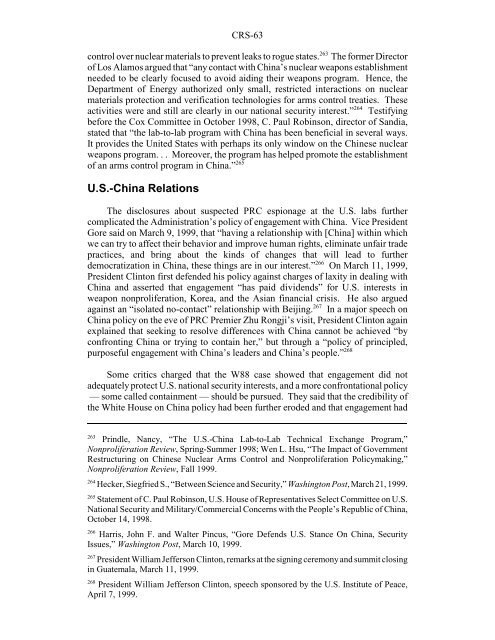China: Suspected Acquisition of U.S. Nuclear Weapon Secrets
China: Suspected Acquisition of U.S. Nuclear Weapon Secrets
China: Suspected Acquisition of U.S. Nuclear Weapon Secrets
Create successful ePaper yourself
Turn your PDF publications into a flip-book with our unique Google optimized e-Paper software.
CRS-63<br />
control over nuclear materials to prevent leaks to rogue states. 263 The former Director<br />
<strong>of</strong> Los Alamos argued that “any contact with <strong>China</strong>’s nuclear weapons establishment<br />
needed to be clearly focused to avoid aiding their weapons program. Hence, the<br />
Department <strong>of</strong> Energy authorized only small, restricted interactions on nuclear<br />
materials protection and verification technologies for arms control treaties. These<br />
activities were and still are clearly in our national security interest.” 264 Testifying<br />
before the Cox Committee in October 1998, C. Paul Robinson, director <strong>of</strong> Sandia,<br />
stated that “the lab-to-lab program with <strong>China</strong> has been beneficial in several ways.<br />
It provides the United States with perhaps its only window on the Chinese nuclear<br />
weapons program. . . Moreover, the program has helped promote the establishment<br />
<strong>of</strong> an arms control program in <strong>China</strong>.” 265<br />
U.S.-<strong>China</strong> Relations<br />
The disclosures about suspected PRC espionage at the U.S. labs further<br />
complicated the Administration’s policy <strong>of</strong> engagement with <strong>China</strong>. Vice President<br />
Gore said on March 9, 1999, that “having a relationship with [<strong>China</strong>] within which<br />
we can try to affect their behavior and improve human rights, eliminate unfair trade<br />
practices, and bring about the kinds <strong>of</strong> changes that will lead to further<br />
democratization in <strong>China</strong>, these things are in our interest.” 266 On March 11, 1999,<br />
President Clinton first defended his policy against charges <strong>of</strong> laxity in dealing with<br />
<strong>China</strong> and asserted that engagement “has paid dividends” for U.S. interests in<br />
weapon nonproliferation, Korea, and the Asian financial crisis. He also argued<br />
against an “isolated no-contact” relationship with Beijing. 267 In a major speech on<br />
<strong>China</strong> policy on the eve <strong>of</strong> PRC Premier Zhu Rongji’s visit, President Clinton again<br />
explained that seeking to resolve differences with <strong>China</strong> cannot be achieved “by<br />
confronting <strong>China</strong> or trying to contain her,” but through a “policy <strong>of</strong> principled,<br />
purposeful engagement with <strong>China</strong>’s leaders and <strong>China</strong>’s people.” 268<br />
Some critics charged that the W88 case showed that engagement did not<br />
adequately protect U.S. national security interests, and a more confrontational policy<br />
— some called containment — should be pursued. They said that the credibility <strong>of</strong><br />
the White House on <strong>China</strong> policy had been further eroded and that engagement had<br />
263 Prindle, Nancy, “The U.S.-<strong>China</strong> Lab-to-Lab Technical Exchange Program,”<br />
Nonproliferation Review, Spring-Summer 1998; Wen L. Hsu, “The Impact <strong>of</strong> Government<br />
Restructuring on Chinese <strong>Nuclear</strong> Arms Control and Nonproliferation Policymaking,”<br />
Nonproliferation Review, Fall 1999.<br />
264 Hecker, Siegfried S., “Between Science and Security,” Washington Post, March 21, 1999.<br />
265 Statement <strong>of</strong> C. Paul Robinson, U.S. House <strong>of</strong> Representatives Select Committee on U.S.<br />
National Security and Military/Commercial Concerns with the People’s Republic <strong>of</strong> <strong>China</strong>,<br />
October 14, 1998.<br />
266 Harris, John F. and Walter Pincus, “Gore Defends U.S. Stance On <strong>China</strong>, Security<br />
Issues,” Washington Post, March 10, 1999.<br />
267 President William Jefferson Clinton, remarks at the signing ceremony and summit closing<br />
in Guatemala, March 11, 1999.<br />
268 President William Jefferson Clinton, speech sponsored by the U.S. Institute <strong>of</strong> Peace,<br />
April 7, 1999.
















